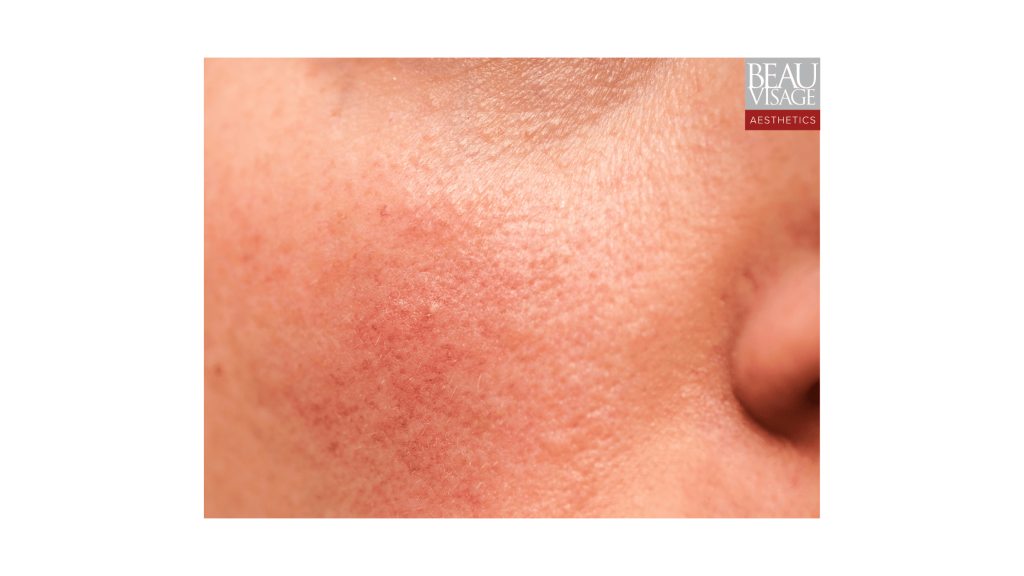The skin-gut axis shows how digestive health influences skin conditions beyond rosacea. This connection plays a key role in inflammation.
Scientific research increasingly supports this link. Imbalances in the gut microbiome can worsen skin disorders like acne, eczema, and psoriasis. These conditions often reflect what’s happening inside the body—especially the gut.
Rosacea is one of the first conditions where the gut-skin connection became widely recognized, as we explored in our previous article on gut health and rosacea.
Understanding this connection helps develop better skincare and treatment strategies. At Beau Visage Aesthetics, we believe in treating the root causes, not just the symptoms.
What Is the Skin-Gut Axis?
The skin-gut axis is the communication network between the digestive system and the skin. It involves the immune system, gut microbiota, and inflammatory responses.
When the gut barrier is compromised, harmful substances may enter the bloodstream. This process, known as intestinal permeability or leaky gut, can trigger systemic inflammation. That inflammation may present as skin flare-ups.
Good gut health supports strong immunity, balanced inflammation, and clear skin. A compromised gut can lead to persistent skin conditions despite topical treatments.
How Gut Health Affects Acne
Acne isn’t always just hormonal. Gut imbalance or dysbiosis can influence oil production, inflammation, and the immune system.
Studies show that people with acne often have altered gut bacteria. Pro-inflammatory diets and antibiotics may worsen both gut health and skin.
A healthy gut can regulate hormone metabolism and reduce systemic inflammation, two key contributors to acne.
Eczema and Digestive Issues
Eczema is another condition linked to gut health. Many eczema patients also report food sensitivities, digestive complaints, or immune-related issues.
The gut microbiome trains the immune system. A disrupted microbiome may cause the immune system to overreact to harmless substances.
Restoring gut balance can often reduce eczema flare-ups. Dietary changes, probiotics, and anti-inflammatory foods may help manage symptoms long-term.
Psoriasis and the Gut-Skin Connection
Psoriasis is an autoimmune condition tied to systemic inflammation. That inflammation often starts in the gut.
Poor digestion, high sugar intake, and alcohol consumption can all inflame the gut lining. In turn, that inflammation can trigger immune responses that worsen psoriasis.
Several studies have found that people with psoriasis have lower gut microbiota diversity. Gut-healing diets and targeted probiotics may ease symptoms and reduce medication dependence.
Leaky Gut: A Root Cause of Inflammation
Leaky gut allows toxins and partially digested food to pass into the bloodstream. This process activates the immune system and causes chronic inflammation.
The skin is often a target of that immune response. This can lead to flare-ups of rosacea, acne, eczema, or psoriasis.
Improving gut barrier integrity can calm skin inflammation. Avoiding processed foods, sugar, and alcohol may also help protect the gut lining.
Holistic Skin Treatments at Beau Visage Aesthetics
At Beau Visage Aesthetics, we take a functional and holistic approach. We consider how gut health influences skin problems and tailor care accordingly.
We may recommend:
Skin-safe probiotics
Anti-inflammatory nutrition planDigestive enzyme support
Lifestyle changes to reduce stress and inflammation
These tools complement in-office treatments like facials, lasers, and topicals. Combined, they promote long-term skin health and vitality.
Signs Your Skin Problems May Be Gut-Related
Not sure if your skin issue is connected to gut health? Here are common signs:
You experience bloating, constipation, or frequent digestive issues
Skin symptoms worsen with certain foods
You’ve used many topicals with little improvement
You have a history of antibiotics or high sugar intake
If these sound familiar, your skin problem may be deeper than the surface.
Improving Gut Health to Support Skin Healing
You can start healing your gut and skin with these steps:
- Eat a whole-food, anti-inflammatory diet
- Avoid processed foods and refined sugars
- Include fermented foods like kefir, sauerkraut, and yogurt
- Stay hydrated and manage stress
- Work with a practitioner to find the right probiotics
Skin healing takes time. But when you treat the gut first, the results are often more sustainable.
Conclusion
The skin-gut axis is more than a buzzword—it’s a vital connection in understanding skin conditions. From acne to psoriasis, the gut plays a role.
At Beau Visage Aesthetics, we address internal and external health to support lasting skin transformation.



